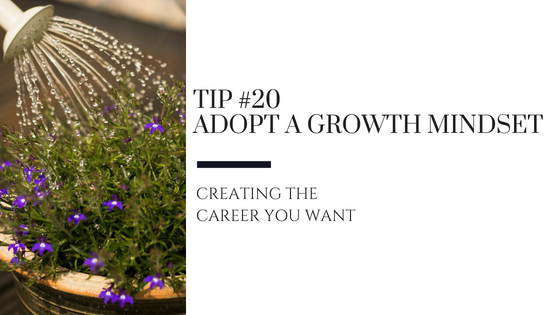Do you think people are born with a fixed amount of talent and intelligence? Research shows that people who adopt this belief – who have a fixed mindset – tend to shy away from difficult challenges, avoid working on skill development, and lack resilience. If someone with a fixed mindset makes a mistake or finds a task too challenging, their conclusion is often that they’re not smart enough to accomplish the task, so they shouldn’t even try. On the other hand, those who have a growth mindset – who believe that ability can be developed through dedication and hard work – embrace difficult challenges as an opportunity to learn and develop, work harder and longer at the task, and are more likely to find success. You have the power to choose your mindset. Adopt a growth mindset.
How can you tell if you have a fixed mindset or a growth mindset? When you experience a failure, do you give up or do you try something else? Do you only pursue activities where you know you’ll shine, or do you take necessary risks because you see them as an opportunity to learn? Your responses to these questions will take you a long way towards understanding your mindset, and helping you develop a growth outlook. Research shows that our brains can grow and develop throughout our lifetime through neurogenesis and neuroplasticity, which means that it is possible to be smarter tomorrow than you are today. If you find yourself thinking something like, “I’m not smart enough, talented enough, or creative enough to do this,” you are experiencing a fixed mindset. Shift your attitude and tell yourself “I can be better at this if I learn some new skills and work hard.” And then, figure out what you need to learn and double down on your effort. You may be surprised at how much you can accomplish.
For more information on this tip: Mindset – the New Psychology of Success by Carol S. Dweck.
For more Career Tips, check out: Welcome Change Blog

